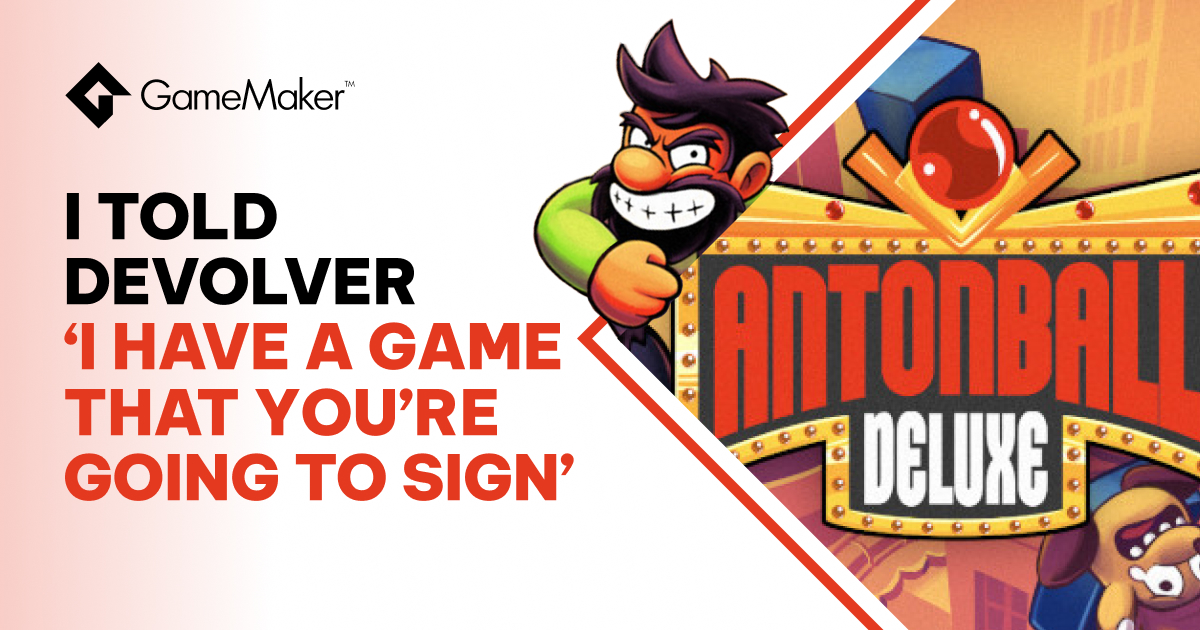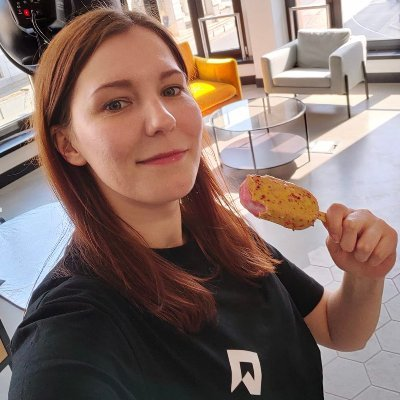You may know Summitsphere as the studio behind upcoming destructive platformer ANTONBLAST, but did you know the Anton series actually began with Antonball Deluxe?
Lead designer and Summitsphere head Tony Grayson spoke about the origins of the Anton character, why he chose to build the series in GameMaker, and the time he gatecrashed Devolver’s E3 exhibit to pitch his first game.
How long have you been making games?
I’ve been making games for a little over 15 years.
I’ve been doing it way too long, I’m way too old, and I would like to stop sometime soon.
How did you start making games?
I started around 2007, when I was nine years old. My mum introduced me to video games, which I loved, but I also had an artistic streak. I would draw pictures and come up with ideas for games.
I would always read the behind the scenes articles about game developers. Naughty Dog published a feature about the development of the Crash Bandicoot series, my absolute favourite games, and I decided to make my own project.
I looked up game dev software and came across GameMaker. I started banging my head against it, and because I was a stubborn mule, I never looked up any tutorials. I drag-and-dropped everything, and somehow, made something playable. From there, I started sharing my awful games on fan forums.
I ended up making some friends through those forums and 15 years later, one of my friends from that time is now a producer at Summitsphere. In a way, I owe GameMaker for the existence of Summitsphere and the career I have.
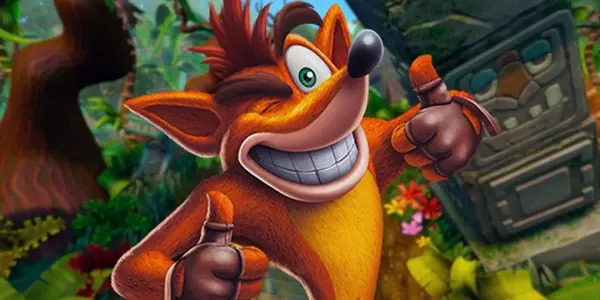
Crash Bandicoot, inspiring video game developers since 1996
Was your mum also interested in game development?
Both my parents were into games. My mum loved Crash and Spyro, and she still plays games to this day. She takes an interest in my work, but I don’t think either of my parents will ever consider it a real job.
I can show them all the Kickstarter money and they’ll say: ‘Oh, that’s nice. Anyway, will you come over and do the dishes?’
Was Antonball Deluxe the only game you had a publisher for?
Before Antonball Deluxe, we had a beat ‘em up game that we were pitching called Harm Yarders.
It was a Battletoads type game, and we want to revisit the concept eventually. We actually pitched it to Devolver, and that’s a whole story in itself.
How did that go?
Harm Yarders was our first game as a team, our own original project. The conventional wisdom in 2018 was ‘You need a publisher for your games’, and if you want to get a publisher, you go with Devolver. Everyone wanted to sign up with Devolver, and our game was made for their catalogue - bloody, gory, and cartoon-y.
At the time, I thought ‘If I send them an email, it’s just going to get lost.’ E3 was coming up, and I decided to walk onto their lot, since E3 wouldn’t let Devolver exhibit at the venue, and show them the game. I found their booth on the first day of E3 and was told that appointments were all booked up, but I could come back next year! I spent all my savings on getting there - no way I was going to wait.
Instead, I walked over to Mike Wilson who, at the time, was the founder and the head of Devolver. I said, ‘Hey, Mike. You don’t know me, but I’m Tony, and I’ve got a game here that you’re going to sign.’ He looked at me and responded: ‘I don’t do that actually, but here’s my greenlight guy.’
Before I knew it, I was pitching my studio’s first game. I was so nervous about it before I went up there. I don’t know what possessed me… I might’ve become Anton for a moment!
I got some good feedback - not really on the game, but on how to present my ideas. They liked the game, and I’d gotten some emails, but they didn’t sign it.
I will never stop telling that story, if only because it was just a really funny example of how to be cocky, and that’s what represents our studio’s direction in general, even to the way we handled the Kickstarter.
To differentiate ourselves from other indie devs, we proudly declared ‘Hey, we’re not just poncy indie devs, we’re not going to be humble! We’re just as good as your Hotline Miamis and your Celestes. We’re even better, we’re better than Cuphead!’
I love all those games, don’t get me wrong, but we didn’t intend to be humble about ourselves.
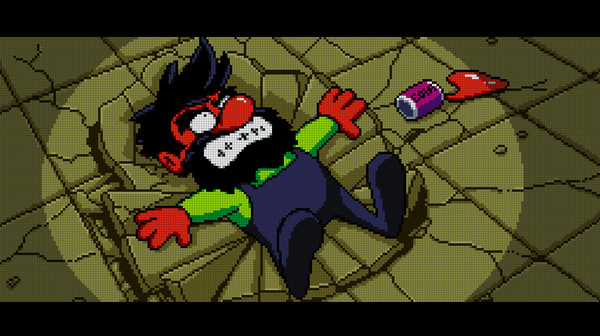
One day Anton will catch a break...
Did the successful Kickstarter campaign affect your opinion on publishing?
I think what was the most freeing thing about the Kickstarter versus doing the game with a publisher, was that when we did the campaign it was sink or swim. We were reliant entirely on our own marketing and presenting the game as we thought it should be presented, versus being beholden to how someone else thought it should be.
Over the course of 30 days, ANTONBLAST achieved better results than Antonball had, thanks to our direct link to the community and style of marketing.
Funnily enough, after that successful campaign, a lot of the publishers who rejected us came back and said, ‘Hey, how’s it going, man? Your game looks really cool, people seem to really like it.’. I understand why publishers want to jump on it now, but it’s like, I could’ve told you that. We ran our own numbers, it would’ve made the money back over the course of a year.
People dropped over $140,000 on the Kickstarter alone. You bring that to Steam, Switch, any platform that people really know beyond the hardcore gaming niche? You’re likely to do well if you continue that marketing cycle.
All love to my publisher friends, though, this isn’t an anti-publisher tirade. Think of me as an ex-girlfriend - you could’ve had me, but you didn’t.
Why do you think the publishers weren’t keen on taking a risk on ANTONBLAST?
ANTONBLAST is a game that feels very familiar, but it’s very different for the indie space. A lot of other indie titles go for a very polished, cool look, and I love that, but I’m not capable of doing it myself. I can’t draw like that, so ANTONBLAST has a very rough and tough design.
Maybe it just wasn’t perceived as safe? We had this whole graffiti look, and there’s alcohol and cigarettes and sex workers.
(I mean, there’s no sex workers, but maybe, maybe one day. I won’t say no to any partnerships. We’re sex positive here at Summitsphere.)
When did the idea for the Anton franchise come to you?
Anton was my first ‘original character’, so to speak. I’d just drawn this goofy red guy back in 2007 for just my forum profile picture. He didn’t have a name, he was just Red Guy. At some point I decided to make a game about him. I made a few attempts over the years.
Not getting Harm Yarders signed up with a publisher put us on the back burner. It was our Triple-A title, the next big thing. I needed to blow off some steam, and there was this game jam, called GB Jam, I wanted to be a part of. You had to stick to 160x144 resolution, only a D-pad, A, B, Start, Select, four colours only, just like on the classic Game Boy.
At some point, I thought to myself, ‘Huh, I wonder how GB Jam’s doing’. I checked and realised that there were only three days left to participate.
I sat down at my computer, and decided to use Red Guy as my main character. Looking at a bunch of old Game Boy games, I decided to do a sort of sideways Arkanoid. It had bricks on one side, and then on the other side you had your player character. He’d jump around, kick a ball, and hit it back and forth. It was a simple, but unique take, because to my knowledge, no-one had done that before.
I had the ambitious idea of doing 99 levels in three days, but it didn't work out, so I made five or six. I realised I couldn’t call him Red Guy anymore because the game was black and white, so I picked Anton and changed the name from Brick Ball to Antonball - it was unique and worked better for SEO.
Somehow my three-day effort came fifth or fourth in the jam versus all the two-week efforts.
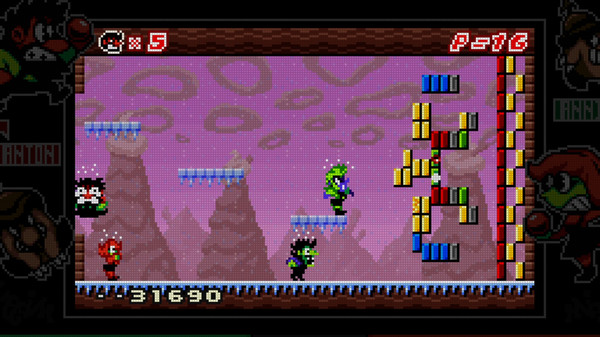
One of the many (or five) levels of Antonball
What aspects of indie game development do you find challenging?
Obviously the financials for me are probably the most difficult part, but there are a few components that are equally difficult.
Business development is actually one of the hardest parts of game developing, and no-one really talks about that. There’s so much you can learn in terms of art, music, design and programming, since these are actionable skills. Business development? Not so much.
Negotiating with publishers or platform holders is extremely difficult, and people either don’t want to learn, which I understand, or some people just don’t know it’s an option, and they get screwed over in publishing deals. Business development usually takes up at least half of my day as a developer. There’s also the drive to push yourself as a developer.
I was also very concerned that the team would overwork ourselves. Crunch is a big problem, and the reality is everyone has to do it. It just happens, but you really don’t want it to happen. It shouldn’t be a tool, it should be a last resort. It was just a necessity of our situation, and we regret that, but ultimately I think we made a good point of minimising that.
Why did you choose to work with GameMaker?
Our games are primarily 2D and pixel-based games. You have some other options on the market today. Unity, Godot, Unreal if you’re a crazy person, but GameMaker for me, as someone who’s fascinated by hardware and going beyond their limitations, gives a perfect balance of that.
Compared to other engines, GameMaker lets you work in integers. In the olden days, integer calculation was how it was done for collisions. Being able to render stuff in integers, and write our own shaders to be able to work with a pixel grid was extremely important, and GameMaker was so well-suited to that, unlike other 3D engines retrofitted to 2D.
GameMaker is really the only pro grade engine on the market that’s like, hey, we’re pixel 2D, baby! It’s so well-suited to pixel stuff, and low-resolution stuff, so my old-school meets new-school approach to game development just works really well with that.

As a designer, I’m not a brilliant programmer by any means. We have the amazing Massimo Gauthier on the team for that. The good thing about GML as a scripting language is as a designer, I can do so much.
I wrote the entire game feel for Anton in ANTONBLAST that basically didn’t get changed, whereas in Unity or Unreal or even Godot, I would have had to prototype in something else, or write it out, and then give it to our programmer. It’s a combination of the ease of use, plus the power that you get. It’s a very rare balance - most engines don’t afford that.
GameMaker’s so lightweight, as well! I’m obsessed with optimisation. Our previous game is under 50MB, and it’s a full-featured game. You have over 21 characters, a bunch of different music, and we were able to compress all of that.
On Switch, because of all the associated packages and compatibility scripts and whatever, it’s somewhere around 200MB, but still, most games you buy these days are not that small.
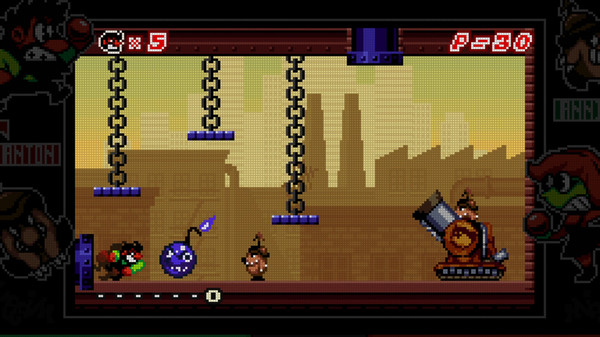
One of the maps you will see reborn in ANTONBLAST
Is there anything that frustrates you about GameMaker?
In the late hours of development, I’m swearing constantly. So far, to be honest, I’ve been really impressed with the changes that have been made to GameMaker under the new ownership. The new direction has been phenomenal. The news that things are open sourced, the basis for NETCO built in, when for the previous game we had to do all of our own net code, which was hell.
I used to be very critical, but these days things are looking great. I would say keep the faith, and try to cater to professional users as much as possible. Obviously, you do want to bring in as many new users as possible to grow the ecosystem, but on the other hand if we cater too much to that audience then it becomes difficult for power users.
To this day, GameMaker is the engine I recommend to new developers, so you guys are doing something right.
Check out the second part of our interview with Tony, where we discuss the origins of ANTONBLAST’s red-hot Kickstarter campaign and the surprising number of developers who passed on the chance to sign the game.

